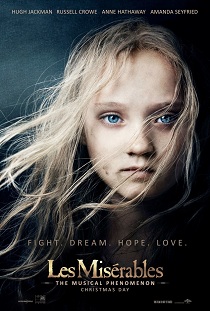 If fans of Claude-Michel Schönberg and Alain Boublil’s musical Les Misérables can go into Tom Hooper’s film adaptation looking for little more than a music video showcase of the songs of Les Mis, they will emerge happy. If however the viewer wanted a masterful adaptation of a beloved musical from stage to screen, then they will have to look elsewhere.
If fans of Claude-Michel Schönberg and Alain Boublil’s musical Les Misérables can go into Tom Hooper’s film adaptation looking for little more than a music video showcase of the songs of Les Mis, they will emerge happy. If however the viewer wanted a masterful adaptation of a beloved musical from stage to screen, then they will have to look elsewhere.
I must start with a brief discussion of what makes Les Misérables powerful as a stage production in order to illustrate why Hooper’s cinematic version falls so short of its goals.
The stage is a single large space defined by the set and the stage lights. One must use the changing compositions of a static frame in order to tell us the story. Blocking, gesture, stage direction all define the nature of the composition.
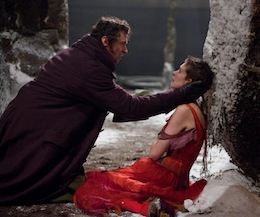 Because we are unable to get close to the characters, the dialogue, or in the case of Les Misérables Herbert Kretzmer’s lyrics, carry the emotion and psychological content within each character to the audience.
Because we are unable to get close to the characters, the dialogue, or in the case of Les Misérables Herbert Kretzmer’s lyrics, carry the emotion and psychological content within each character to the audience.
If you appreciate and enjoy musicals you understand and accept these two things. The staging carries the plot and illustrates the relationships the character’s have to each other, and the songs carry the emotions, drives and desires of each character.
The songs of Les Misérables walk the viewer through the emotional paces. We understand the broken dreams of Fantine (Anne Hathaway) not because we have seen her extended backstory, but because she sings about those failed dreams upon becoming a prostitute to support her young daughter Cosette (Amanda Seyfried and Isabelle Allen).
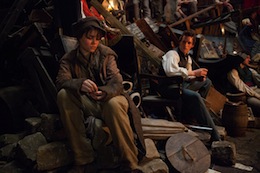 In the same way, we never see Jean Valjean’s (Hugh Jackman) original offense, stealing a loaf of bread, we only know of it because Valjean sings about it throughout Les Misérables.
In the same way, we never see Jean Valjean’s (Hugh Jackman) original offense, stealing a loaf of bread, we only know of it because Valjean sings about it throughout Les Misérables.
I want to make these issues clear, because criticism of Hooper’s film can easily merge with criticism of the stage musical Les Misérables or of musical theater in general.
I’m okay with musicals, but this film is a flawed and unsatisfying translation of Les Misérables, because Hooper actively undermines what is powerful about the stage version, and doesn’t use his camera’s frame effectively to add anything of value.
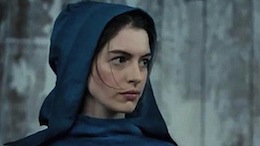 Hooper uses restrictive wide-angle close-ups to put you right in the face of each of his characters. He then also employs an incredibly shallow depth of field. This means that often only the plane of the featured character’s face is in focus, and everything else is a blur.
Hooper uses restrictive wide-angle close-ups to put you right in the face of each of his characters. He then also employs an incredibly shallow depth of field. This means that often only the plane of the featured character’s face is in focus, and everything else is a blur.
I understand that Hooper is trying to do two things. He is trying to accentuate both the isolation that many of the characters feel throughout Les Misérables, and he is also trying to give the viewers a sense of visual intimacy that they cannot get from the stage. He fails on both counts.
 The isolation is not served by the close-up or thin depth of field. It just feels restrictive and I wanted a shot that featured the production design. An actual wide shot that showed this single character isolated by a large set, location, or the lighting would have been more effective. As an example, think of the fire escape scene in West Side Story. We have a mix of shots, but none isolates these two characters in their star-crossed love affair more effectively than the wide shot that spot lights the two and lets the surrounding set fall into shadow.
The isolation is not served by the close-up or thin depth of field. It just feels restrictive and I wanted a shot that featured the production design. An actual wide shot that showed this single character isolated by a large set, location, or the lighting would have been more effective. As an example, think of the fire escape scene in West Side Story. We have a mix of shots, but none isolates these two characters in their star-crossed love affair more effectively than the wide shot that spot lights the two and lets the surrounding set fall into shadow.
As to the visual intimacy, the songs are already emotionally expressive enough. If you push the viewer closer and closer, then the moment, which could have been remarkably powerful, becomes forceful and off-putting. We understand the moment without being bludgeoned by it.
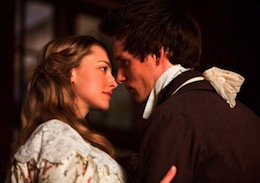 I can understand what Hooper was trying to do and why, but I feel that his approach negates much of what Les Misérables has going for it.
I can understand what Hooper was trying to do and why, but I feel that his approach negates much of what Les Misérables has going for it.
To end on a somewhat positive note, the songs have the same unforgettable ear-wormy effect, and much has been made of the fact that the singing was captured live during each actor’s performance. This makes Anne Hathaway’s rendition of “I Dreamed a Dream” all the more impressive, though Hooper does little more than recreate Sinéad O’Conner’s “Nothing Compares 2 U” video.
If you are unable to see a touring production at some point, then this misguided adaptation may suffice, otherwise save your dollars for a stage production of Les Misérables.







Comments on this entry are closed.